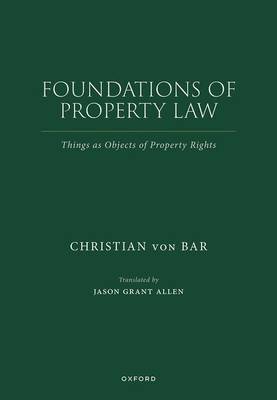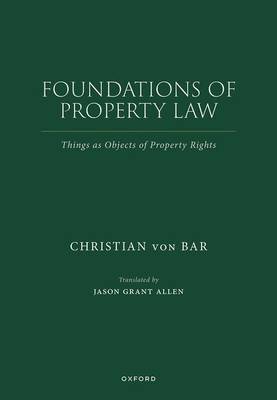
- Afhalen na 1 uur in een winkel met voorraad
- Gratis thuislevering in België vanaf € 30
- Ruim aanbod met 7 miljoen producten
- Afhalen na 1 uur in een winkel met voorraad
- Gratis thuislevering in België vanaf € 30
- Ruim aanbod met 7 miljoen producten
Zoeken
Foundations of Property Law
Things as Objects of Property Rights
Christian Von Bar, Jason Grant Allen
Hardcover | Engels
€ 290,45
+ 580 punten
Omschrijving
Foundations of Property Law: Things as Objects of Property Rights is an abridged translation of the first volume of Christian von Bar's Gemeineuropäisches Sachenrecht -a milestone in European private law theory, and in comparative property law more broadly. Radical in content and scope, the English version examines the dynamics of interaction between the objects, contents, and holders of property.
The conceptual framework of 'property law' is presented as a domain of erga omnes monopoly rights that govern the relationship between persons and objects of value. Within that framework, a reciprocal relationship is illustrated between "property rights" and their objects; property rights play a role in constituting the very objects ("things") in which they are held.
With comprehensive comparative analysis, insights are gleaned from all the jurisdictions of the European Union and the United Kingdom, presenting a critical evaluation of property law systems in both Common and Civil Law traditions. This book joins all the national legal systems in a single inquiry, treating their traditions and arguments with the respect they deserve and taking advantage of the knowledge embodied in the diversity of European private law. A scholastic work, offering deep and unique insights into the European property law systems, Foundations of Property Law will quickly become a go-to resource for anyone interested in European private law and comparative property law.
The conceptual framework of 'property law' is presented as a domain of erga omnes monopoly rights that govern the relationship between persons and objects of value. Within that framework, a reciprocal relationship is illustrated between "property rights" and their objects; property rights play a role in constituting the very objects ("things") in which they are held.
With comprehensive comparative analysis, insights are gleaned from all the jurisdictions of the European Union and the United Kingdom, presenting a critical evaluation of property law systems in both Common and Civil Law traditions. This book joins all the national legal systems in a single inquiry, treating their traditions and arguments with the respect they deserve and taking advantage of the knowledge embodied in the diversity of European private law. A scholastic work, offering deep and unique insights into the European property law systems, Foundations of Property Law will quickly become a go-to resource for anyone interested in European private law and comparative property law.
Specificaties
Betrokkenen
- Auteur(s):
- Uitgeverij:
Inhoud
- Aantal bladzijden:
- 480
- Taal:
- Engels
Eigenschappen
- Productcode (EAN):
- 9780198885337
- Verschijningsdatum:
- 25/11/2023
- Uitvoering:
- Hardcover
- Formaat:
- Genaaid
- Afmetingen:
- 43 mm x 99 mm
- Gewicht:
- 839 g

Alleen bij Standaard Boekhandel
+ 580 punten op je klantenkaart van Standaard Boekhandel
Beoordelingen
We publiceren alleen reviews die voldoen aan de voorwaarden voor reviews. Bekijk onze voorwaarden voor reviews.











